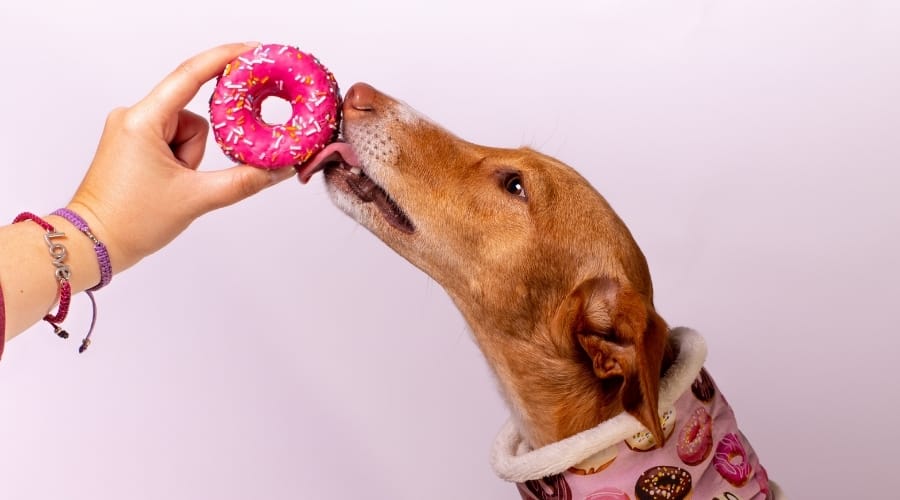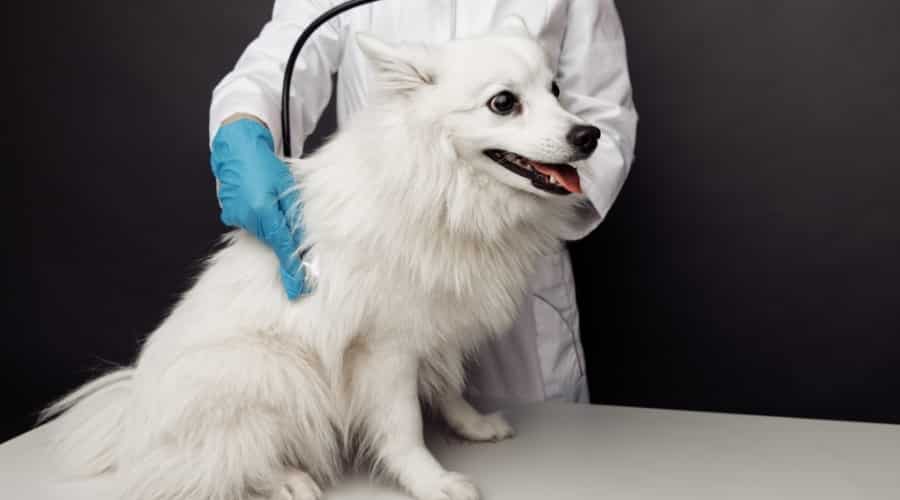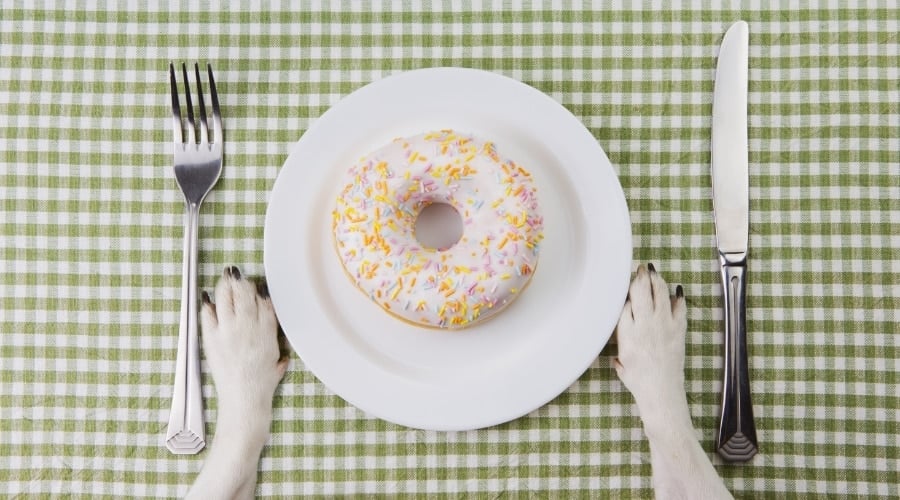Yikes! My Dog Just Ate My Donuts! What Should I Do Now?
When you purchase through links on our site, we may earn a commission. Here’s how it works.
“Mmmmm…donuts…!” Homer isn’t alone. Donuts are surely the tasty treat of choice for many people across the world and are available in myriad sizes, shapes, flavors, fillings, and toppings.
Table of Contents
Donuts are regularly found in many households, and this naturally brings them to the attention of our pets. But are donuts suitable for dogs, and what should you do if you discover your special box of donut treats has disappeared unexpectedly?
If your dog ate a donut (or doughnut, depending on your spelling preference!), these important questions and more will be answered in this article.
Can Dogs Eat Donuts? Are They Bad?

A basic donut is made of flour, milk, water, sugar, salt, yeast, and egg. None of these ingredients are toxic to dogs, so donuts in themselves are not dangerous for dogs.
That said, donuts are not a healthy snack for people, and they are not good for dogs, either. They provide minimal dietary benefits and are very calorific, so they really should be seen as a very occasional treat for both us and our pets.
In general, dogs should not be offered or fed donuts, especially not regularly. If your dog has eaten a donut as a one-off accident, it is unlikely to cause a major problem. Regular or excessive donuts in the diet will lead to obesity in both humans and animals, along with its common side effects (diabetes, heart disease, joint disease, and organ damage).
Problems may arise based on the filling or topping of the donut. Donuts regularly come with chocolate or sweeteners that can be toxic to dogs. Donuts may also not be suitable for dogs with underlying medical conditions.
When Are Donuts Harmful?
We all know the best donuts are those with lots of tasty fillings or toppings, such as those sold by Krispy Kreme or Dunkin Donuts. However, it is these extras that are likely to cause a problem if they are eaten by our canine companions. The main concerns are chocolate and a sweetener called xylitol. Dogs with underlying medical conditions may also suffer if they eat donuts.
Chocolate

Chocolate is poisonous to dogs because of a chemical in it called theobromine. If a dog eats enough theobromine relative to its body weight, it can be toxic, especially to the liver. White and milk chocolates contain the least theobromine, and dark chocolate or cocoa powder contains the most theobromine.
Xylitol

Xylitol is an artificial sweetener that is poisonous to dogs. Xylitol is commonly found in gum or other types of candy. When it comes to donuts, it may be found in the donut itself or in fillings, like jam.
Xylitol acts like insulin in the body and tricks the body into lowering the blood sugar level below what is normal. As a result, dogs end up with dangerously low blood sugar, starving the brain, especially of energy.
Please note that the same plant-derived substance as xylitol is also called “birch sugar” or “birch sap” in ingredient listings. When you’re searching for pet-safe donuts, pay attention to all of these ingredient names.
Underlying Medical Conditions

If your dog suffers from diabetes, pancreatitis, or has a sensitive tummy, then donuts are not an appropriate treat. Diabetic dogs should not be fed treats in any case, as they should be on a strict, regular routine of diet and exercise. Sugary treats cause spikes and instability in blood sugar.
Donuts also have high-fat content, which is not good for dogs with pancreatitis or a sensitive tummy. It may cause flare-ups of tummy pain, vomiting, and diarrhea.
What Should I Do If My Dog Eats a Donut?

The first step is to separate your dog from any remaining donuts! This will ensure that the problem does not worsen before you can figure out what is happening.
Establish What Was Eaten
It is important to establish what Fido has eaten, both in terms of ingredients and how much of the ingredients, if you can. It is also useful to know roughly when your pup ate the donuts, so make a note of the time.
Sugared Donuts
If your dog has eaten sugared donuts, these are unlikely to cause a problem, but it is worth checking the ingredient list to see whether sugared and glazed donuts contain xylitol. If the donuts contain fillings like jams and jellies, again check and save the ingredient list if you can.
Donuts With Chocolate Filling or Frosting
If your dog has eaten a donut with a chocolate filling or a donut with chocolate frosting, make a note of roughly how much they have eaten and what kind of chocolate it is. Save the ingredient list if you can.
Large Quantities
If you suspect Fido has eaten a large number of donuts, or any donuts containing chocolate or xylitol, then it is important to call your local veterinary clinic for advice without delay. This way, if there’s a problem, it’s addressed sooner rather than later.
If your pup has only eaten a small amount of donut, without any chocolate or xylitol ingredients, then it is reasonable to keep a close eye on and monitor him over the next 24-48 hours at home. If your dog shows any signs of being unwell during this period, call the veterinary clinic for advice (especially if he has an underlying condition).
After contacting your veterinarian, it is important to follow their guidance. The clinic will offer their professional advice, and this will often include recommending a check-up and examination at the clinic.
What Happens if My Dog Eats a Donut?

Large quantities of plain donuts may cause a tummy upset, including vomiting and diarrhea. In these situations, it is worth contacting your vet for advice. However, these will be mild and self-limiting in most dogs. Dogs should feel better within 1-2 days.
If Fido ate donuts with chocolate, the crucial decision is whether he has eaten enough theobromine relative to his body weight to be toxic. This will be based on the amount of chocolate eaten, the type of chocolate, and their size. This decision should be made in conjunction with a veterinary professional and is only ever a guideline.
Typically, 100-150mg of theobromine per kilogram bodyweight is considered toxic. Chocolate poisoning will cause vomiting, diarrhea, restlessness, rapid breathing, “drunken” wobbly movements, and potentially seizures. These usually appear within 4-24 hours after eating chocolate.
Donuts with xylitol ingredients in any amount have the potential to be dangerous to any dog. All xylitol exposure is taken seriously by veterinarians. Typically, 50-100mg of xylitol per kilogram of body weight is believed to be highly toxic. Xylitol poisoning will cause vomiting, lethargy, weakness, difficulty moving, collapse, and seizures. These symptoms can appear within 30 minutes to 12 hours after eating xylitol.
What Will My Veterinarian Do?

If your dog hasn’t eaten any dangerous ingredients but has a bit of a tummy upset from the donuts (mild vomiting and diarrhea), it is reasonable to try and manage this at home.
Starving dogs for vomiting is still occasionally recommended, but in general, we now know it is better to keep feeding. Food going into the digestive system helps it heal faster. Dogs should be fed little and often with bland foods like rice and chicken that will not upset the stomach. It is important to encourage fluid intake too.
If your dog has more severe vomiting or diarrhea or is refusing to eat for long periods, then it is worth a check-up at the veterinary clinic. This is more likely if your pup has an underlying medical condition. There may be some simple symptomatic treatment to help speed up their recovery. Alternatively, some dogs require hospitalization for a day or two with fluids via an IV drip if they are dehydrated.
If your pup has eaten donuts containing potentially dangerous ingredients, and the problem is caught early (within the first four hours), the simplest solution is to get those ingredients back out. An early visit to the veterinary clinic allows your veterinarian to give your dog a powerful, reliable injection to induce vomiting and clean out the stomach. This prevents the toxins from being absorbed and is usually the fastest and safest fix.
Chocolate Poisoning
Dogs showing symptoms of chocolate poisoning need more intensive care. Your veterinarian will usually recommend a blood test to check for evidence of liver damage (or even failure). Dogs often need to be hospitalized so they can receive fluids and medication via an IV drip. There is no antidote for theobromine, so this management continues until it has been cleared from the body.
If caught early, this problem is often manageable, but long-term outcomes depend heavily on how much theobromine your dog has absorbed before help is sought. As such, many dogs do well, but in severe cases, they can unfortunately die or have long-term health problems afterward.
I can certainly recall seeing a number of these cases in practice where chocolate had been eaten, as it is sadly a common problem! The best outcomes usually come with inducing vomiting so that we can bring the chocolate up before it causes a problem. I have seen a number of dogs where the chocolate has been absorbed and led to quite a tummy upset and a trembling, shaking dog. The good news is that with appropriate treatment, all of these dogs made a good recovery.
Xylitol Poisoning
Dogs with xylitol poisoning also need intensive care. Your veterinarian will again recommend a blood test to check for blood sugar levels and to check major organ function (liver and kidneys).
Dogs will need to be hospitalized so they can be given supplemental blood sugar (glucose) via an IV drip and so their blood sugar levels can be monitored closely and frequently. There is no antidote for xylitol, so this management must continue until all the xylitol has left the system.
Xylitol poisoning outcomes can also be variable depending on the amount eaten and your dog’s reaction to it. Many dogs do well, but again dogs may unfortunately die or be left with long-term organ damage. The essential point for both chocolate and xylitol poisoning is to contact your veterinarian at an early stage and seek help straight away.
Fortunately, Xylitol toxicity cases seem to be less common now than chocolate, but these cases are always a worry for owners and vets. Dogs can present to the practice outwardly appearing fairly normal, but testing often reveals their blood sugar levels just keep dropping to dangerous levels, even with supplementation and aggressive treatment. This is often a serious health challenge, and treatment can be intensive and need very close monitoring as changes can happen so quickly. This sweetener is very dangerous for dogs of all sizes.
Will My Dog Be Ok After Eating Donuts?

In most situations, donuts will not cause your dog any ill effects at all. In some cases, donuts might give dogs a mild tummy upset for a day or two.
If any potentially toxic ingredients were consumed, then it is important to seek help early to give him the best chance of a good outcome. Again, most dogs will do well, but if they are allowed to absorb large amounts of toxins, then this can cause organ damage, death, and long-term health issues. The outcomes are highly variable depending on your dog and how much toxin is absorbed.
Frequently Asked Questions
Are donuts harmful to dogs?
Basic donuts are not harmful to dogs if consumed in small amounts as a one-off. Regular, large amounts of donuts can predispose to obesity as they are very calorie-dense, with all the associated problems obesity brings. Donuts are only harmful in the short term if they contain toxic ingredients like xylitol or chocolate.
Can my dog have a donut hole?
Donuts and donut holes do not provide any nutritional benefits to canines. But, as a one-off treat, most dogs can have a plain donut hole with minimal risks. Do check first that the donut hole does not contain any xylitol or chocolate, and do not feed these kinds of treats if your dog has diabetes, pancreatitis, or a sensitive tummy.
Can dogs eat jam donuts?
Donuts and jam are again not usually harmful to dogs in themselves but do check that the jam especially does not contain xylitol. Otherwise, jam donuts are not dangerous to dogs unless your dog has an underlying health condition (as mentioned). No type of donut is suitable as a regular treat for dogs.
Can a dog die from eating a chocolate donut?
Chocolate is toxic to dogs because of theobromine, and so if your dog eats enough theobromine in the donuts, then it can be deadly. The toxicity depends on the amount of chocolate eaten, the type of chocolate, and your pup’s size. Seek veterinary advice if you think any chocolate was consumed.
Final Thoughts
Donuts (or doughnuts) are a tasty treat found in many stores and households around the country. They are not in themselves dangerous to our dogs but should never be eaten in large or regular quantities as they will cause weight gain and obesity.
Donuts are only potentially a risk to pets if they have underlying health conditions or if the donuts contain xylitol or chocolate. If you think your dog has eaten any of these toxic ingredients, make sure to contact your local veterinary clinic as early as possible.



